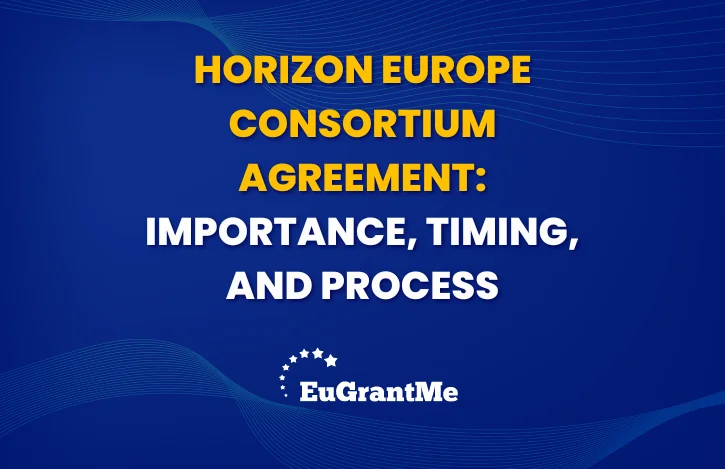In the realm of collaborative research projects funded by Horizon Europe, the Consortium Agreement holds paramount importance. Understanding the Consortium Agreement Horizon Europe entails comprehending its significance, optimal timing for drafting, and the procedural intricacies involved in its formulation. In this extensive guide, we delve into the essence of Horizon Europe Consortium Agreement, elucidating its importance, ideal timing for drafting, and the procedural intricacies involved in its formulation.
Significance of the Consortium Agreement
The Consortium Agreement is the cornerstone of collaborative research projects under Horizon Europe. It lays out the terms and conditions governing the relationship between project partners, defining their rights, obligations, and responsibilities throughout the project lifecycle. By establishing clear guidelines and protocols upfront, the Consortium Agreement mitigates conflicts, ensures accountability, and facilitates effective collaboration, thereby maximising the chances of project success. Moreover, a well-crafted Consortium Agreement provides a framework for addressing potential challenges, such as intellectual property disputes, resource allocation issues, and data sharing concerns, fostering a harmonious and productive research environment.
Timing of Consortium Agreement Drafting
Timing is critical when it comes to drafting the Consortium Agreement for Horizon Europe projects. While it may be tempting to delay the drafting process until the project is well underway, doing so can lead to misunderstandings, delays, and even project failure. Ideally, the Consortium Agreement should be drafted at the outset of the project, allowing partners to clarify expectations, allocate resources, and resolve any potential disputes before they escalate. Early engagement and consensus-building are key to ensuring a smooth and harmonious collaboration. Furthermore, drafting the Consortium Agreement early on enables project partners to align their goals and objectives, establish a clear governance structure, and develop a shared understanding of project deliverables and milestones, laying a solid foundation for collaborative research endeavours.
Process of Formulating the Consortium Agreement
The process of formulating the Consortium Agreement involves several key steps and considerations. Firstly, project partners must identify and address key issues such as IP rights, data sharing, resource allocation, decision-making processes, and dispute resolution mechanisms. This may require extensive negotiations and consultations among partners to reach consensus on sensitive issues. Once the terms are agreed upon, the Consortium Agreement should be drafted by legal experts or experienced professionals to ensure clarity, enforceability, and compliance with Horizon Europe regulations. Moreover, ongoing communication and collaboration among project partners are essential throughout the drafting process to address emerging issues, reconcile conflicting interests, and ensure that the Consortium Agreement reflects the collective vision and objectives of all stakeholders involved.
Key Components of the Consortium Agreement
The Consortium Agreement typically includes several key components, each addressing specific aspects of the collaborative research project. These may include provisions related to project objectives and scope, governance structure, financial arrangements, intellectual property rights, confidentiality, publication policies, and dispute resolution mechanisms. Tailoring the Consortium Agreement to the unique needs and dynamics of the project ensures that all partners are aligned and committed to achieving shared goals and objectives. Furthermore, incorporating clear and comprehensive provisions in the Consortium Agreement helps to mitigate risks, minimise uncertainties, and enhance the overall transparency and accountability of the collaborative research endeavour.
Compliance with Horizon Europe Regulations
Ensuring compliance with Horizon Europe regulations is essential when drafting the Consortium Agreement. Project partners must adhere to the guidelines and requirements outlined in the Horizon Europe Grant Agreement and associated documents. This may involve incorporating specific clauses and provisions into the Consortium Agreement to reflect the terms and conditions set forth by the European Commission. By aligning the Consortium Agreement with Horizon Europe regulations, project partners can mitigate risks, maintain eligibility for funding, and ensure smooth project implementation. Furthermore, compliance with Horizon Europe regulations enhances the credibility and legitimacy of the Consortium Agreement, instilling confidence in project stakeholders and facilitating effective project governance and management.
Final Remark
In conclusion, the Consortium Agreement is a vital document for collaborative research projects funded by Horizon Europe. Its significance cannot be overstated, as it governs the relationship between project partners and sets the stage for successful project implementation. By understanding the importance, timing, and process of drafting the Agreement, project partners can navigate the complexities of collaborative research effectively, maximising the impact and success of their Horizon Europe projects. Moreover, adherence to Horizon Europe regulations and incorporation of key components in the Consortium Agreement are essential for ensuring compliance, transparency, and accountability throughout the project lifecycle. Ultimately, a well-crafted Consortium Agreement serves as a roadmap for collaborative research endeavours, fostering innovation, collaboration, and knowledge exchange across borders and disciplines.
At EuGrantMe, we are passionate about fostering innovation and empowering ambitious minds to flourish. Our mission revolves around providing top-notch grant writing services for the EIC Accelerator and Horizon grants in Europe, enabling our customers to unlock the full potential of their ground-breaking ideas.
Do you have a project to turn into reality?
Contact us!


